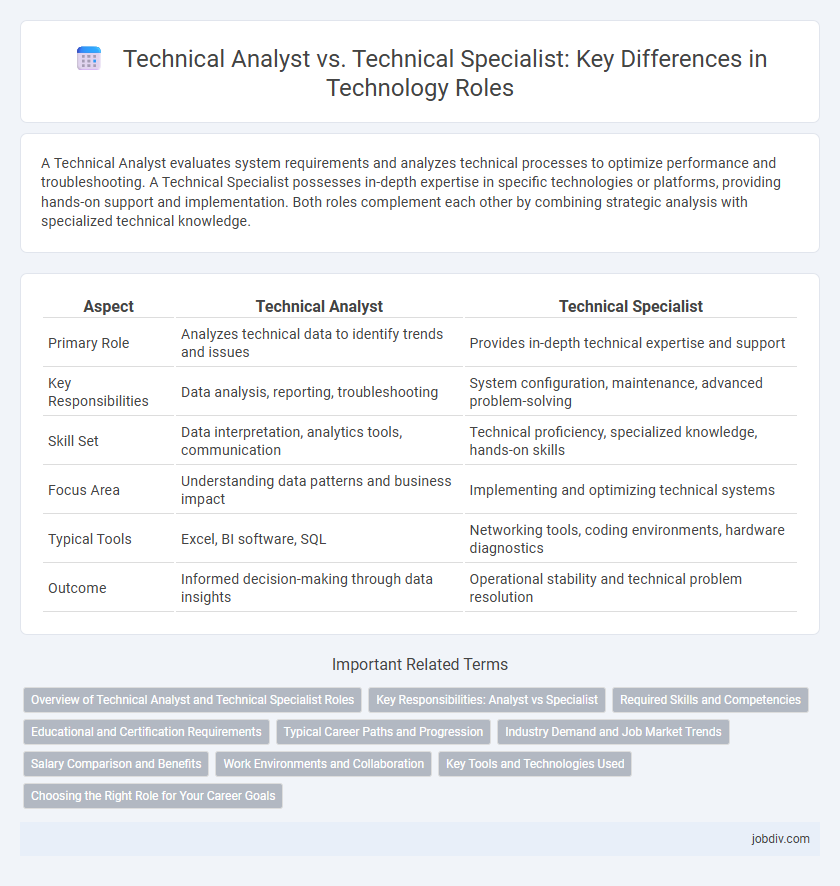A Technical Analyst evaluates system requirements and analyzes technical processes to optimize performance and troubleshooting. A Technical Specialist possesses in-depth expertise in specific technologies or platforms, providing hands-on support and implementation. Both roles complement each other by combining strategic analysis with specialized technical knowledge.
Table of Comparison
| Aspect | Technical Analyst | Technical Specialist |
|---|---|---|
| Primary Role | Analyzes technical data to identify trends and issues | Provides in-depth technical expertise and support |
| Key Responsibilities | Data analysis, reporting, troubleshooting | System configuration, maintenance, advanced problem-solving |
| Skill Set | Data interpretation, analytics tools, communication | Technical proficiency, specialized knowledge, hands-on skills |
| Focus Area | Understanding data patterns and business impact | Implementing and optimizing technical systems |
| Typical Tools | Excel, BI software, SQL | Networking tools, coding environments, hardware diagnostics |
| Outcome | Informed decision-making through data insights | Operational stability and technical problem resolution |
Overview of Technical Analyst and Technical Specialist Roles
Technical Analysts primarily focus on analyzing system requirements, troubleshooting software issues, and providing data-driven insights to optimize IT performance. Technical Specialists possess deep expertise in specific technologies or platforms, delivering advanced technical support, system configuration, and implementation services. Both roles collaborate to ensure seamless IT operations, with Analysts emphasizing diagnostic evaluation and Specialists driving specialized technical solutions.
Key Responsibilities: Analyst vs Specialist
Technical Analysts focus on analyzing system requirements, troubleshooting software issues, and providing data-driven insights to optimize performance and support decision-making. Technical Specialists possess deep expertise in specific technologies, managing system implementations, configuring applications, and offering advanced technical support to ensure operational efficiency. Both roles complement each other by combining analytical problem-solving with specialized technical knowledge to maintain and enhance IT environments.
Required Skills and Competencies
Technical Analysts excel in data interpretation, trend analysis, and systems evaluation, requiring strong analytical skills, proficiency in statistical software, and a deep understanding of business processes. Technical Specialists possess advanced technical expertise in specific tools or technologies, demanding hands-on experience, problem-solving capabilities, and up-to-date knowledge of industry standards and protocols. Both roles necessitate excellent communication skills to translate complex technical findings into actionable business insights.
Educational and Certification Requirements
Technical Analysts typically require a bachelor's degree in information technology, computer science, or engineering, alongside certifications such as CompTIA Security+, Certified Business Analysis Professional (CBAP), or ITIL Foundation. Technical Specialists often possess advanced knowledge in specific technologies, necessitating certifications like Cisco Certified Network Professional (CCNP), Microsoft Certified: Azure Administrator Associate, or AWS Certified Solutions Architect, supplemented by targeted technical training. Both roles benefit from continuous education, but Technical Analysts emphasize analytical frameworks and business processes, while Technical Specialists prioritize deep technical expertise and hands-on experience.
Typical Career Paths and Progression
Technical Analysts typically begin their careers by analyzing systems and data to identify issues and improve processes, often progressing into roles such as Business Analyst or Project Manager. Technical Specialists focus on deep technical expertise and hands-on problem-solving, advancing towards senior specialist roles, technical consulting, or IT architecture positions. Both career paths emphasize continuous learning and certifications but diverge in their focus on strategic analysis versus technical mastery.
Industry Demand and Job Market Trends
Technical Analysts are increasingly sought after for their expertise in data interpretation and strategic decision-making, driving demand in finance, IT, and telecommunications sectors. Technical Specialists focus on hands-on skills and system implementation, maintaining steady demand in industries relying on specialized technical infrastructure such as manufacturing and healthcare. Job market trends indicate a growing preference for hybrid roles combining analytical insight with technical proficiency to adapt to evolving technology landscapes.
Salary Comparison and Benefits
Technical Analysts typically earn between $65,000 and $95,000 annually, reflecting their role in data interpretation and strategic decision support, while Technical Specialists command higher salaries ranging from $80,000 to $120,000 due to their advanced expertise and hands-on technical problem solving. Benefits for Technical Specialists often include specialized training programs and certifications reimbursement, whereas Technical Analysts may receive bonuses tied to project success and performance metrics. Both roles offer health insurance and retirement plans, but Technical Specialists generally have greater access to career advancement opportunities within technical tracks.
Work Environments and Collaboration
Technical Analysts often work in dynamic environments such as IT departments, consulting firms, or financial institutions, collaborating closely with business stakeholders to translate technical requirements into actionable insights. Technical Specialists typically operate within focused technical teams, like software development or network management units, providing expert knowledge and hands-on problem solving. Both roles require strong collaboration skills, but Analysts bridge communication between technical and non-technical teams, while Specialists drive deep technical execution within specialized groups.
Key Tools and Technologies Used
Technical Analysts leverage tools like SQL, Excel, and data visualization platforms such as Tableau or Power BI to interpret data trends and generate actionable insights. Technical Specialists focus on technologies including network infrastructure, operating systems, and specialized software like Cisco, VMware, or cloud platforms such as AWS and Azure to implement and maintain technical solutions. Both roles require expertise in scripting languages like Python or PowerShell to automate tasks and optimize system performance.
Choosing the Right Role for Your Career Goals
A Technical Analyst focuses on interpreting data, identifying system issues, and recommending improvements to optimize technical processes, making it ideal for those interested in problem-solving and data-driven insights. A Technical Specialist offers deep expertise in specific technologies or systems, supporting implementation and maintenance, suited for professionals aiming to develop specialized technical skills. Evaluating your strengths and career goals helps determine whether a broad analytical role or a focused technical proficiency aligns best with your long-term aspirations.
Technical Analyst vs Technical Specialist Infographic

 jobdiv.com
jobdiv.com